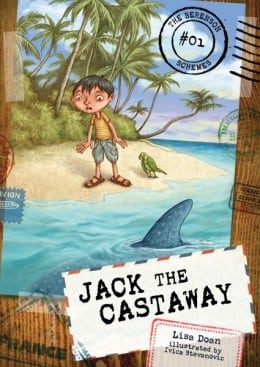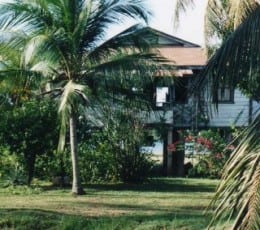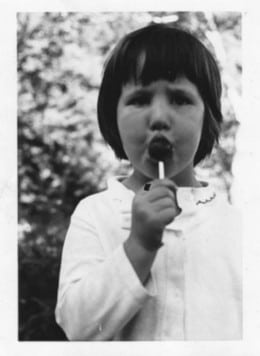 Today I welcome Lisa Doan to World Reads, a blog that features interviews with authors who’ve written a story set outside of the United States for children or young adults.
Today I welcome Lisa Doan to World Reads, a blog that features interviews with authors who’ve written a story set outside of the United States for children or young adults.
What is the title of your book? The pub date and publisher? Genre? Targeted age group?
The Berenson Schemes #01 – Jack the Castaway. April 1, 2014. Lerner Publishing Group. Humor/Adventure. Middle grade series 9-12 years.
Where is it set?
I did not name the island in my book, but the setting was modeled on Roatan, where I lived for eight years. Roatan is just off the coast of Honduras and is part of the Bay Islands, along with Utila and Guanaja. It has a history as a pirate island, and descendants of pirates still live there today. Now, it attracts scuba divers from all over the world because of its magnificent reef wall. As it was once a British Colony, most islanders speak English as their first language and Spanish as the second. I lived in a small village named West End. It is bigger now, but when I moved there in the late 90’s it was just a sandy lane that ran along the sea with a couple of restaurants and dive shops catering to backpackers. It was the perfect setting for Richard and Claire Berenson to launch an ill-advised get-rich-quick scheme – inventing a new sport called ‘drift-snorkeling.’ (FYI – snorkeling and strong currents are not a natural pairing.) While they may seem over-the-top to people who have not spent time in these sorts of places, I can assure you there are real Richard and Claire Berensons lurking in off-the-beaten-track locales all over the world.
In 70 words or less, provide a succinct plot description of your story.
The Berenson Schemes series is about a cautious boy named Jack who is repeatedly lost in the wilderness in foreign countries by his parents who are chasing get-rich-quick schemes. Jack is a helicopter kid with supremely anti-helicopter parents.
Links to reviews or blurbs you wish to share:
School Library Journal:
“The story is a well-written debut novel and an introduction to a fun cast of characters and a series certain to be full of adventure. Pencil illustrations bring life to Jack and all of the craziness he and his family experience. This will likely entertain even the most reluctant of readers.”
Booklist:
“In Doan’s entertaining debut, Jack’s misadventures begin once his absentee parents show up and whisk him off to the Caribbean. A sensible 11-year-old, Jack would much rather stay in Pennsylvania than risk his life on one of his parents’ dangerous get-rich-quick schemes.”
Publisher’s Weekly:
“Launching the Berenson Schemes series, Doan’s debut novel pits cautious Jack Berenson against his reckless parents with uproarious results.”
Kirkus:
“Readers will be charmed by Jack, whose flair for checklists and self-preservation is both humorous and endearing.”
 How are you connected to the setting of your story?
How are you connected to the setting of your story?
I worked in New York City straight out of college for about thirteen years. All that time, I really wanted to go off and explore the far reaches of the planet. So, one day I quit my office job and spent a year traveling from Morocco to Kenya, backpacking overland. After a few stops in Asia, I returned to New York. But I couldn’t stay. How dull to sit in a meeting, listening to investment bankers drone on about their bone-crushingly boring deals when I had trekked through the jungles of Uganda, watched the sun rise over the Sahara, camped out in Cameroun, hitchhiked to Lake Turkana and walked the cobblestone streets of Lamu. So, I took up scuba diving, quickly became an instructor and moved to Roatan, Honduras. I taught scuba there, as well as opened a tiny restaurant, worked as an EMT and even worked as a set medic on what might be the silliest reality television show ever produced – Temptation Island. (Sorry Mark Walberg – you were the only good thing about it!)
What inspired you to write this story?
When I heard the term “helicopter parents,” I decided to write something about risk-taking for “helicoptered kids.” These kids are experiencing life from inside bubble-wrap. All potential physical harm is removed or padded and helmeted. As for mental harm, the idea that children need to be protected from disappointment, that “everybody is a winner,” is just cruel. What a surprise they will get when they find out their future boss doesn’t think “everybody is a winner.” That is romanticizing childhood and attempting to turn it into a Disney movie, blithely ignoring personal memories of growing up – that it was a rough and tumble, dog eat dog, sometimes thrilling, often terrifying, high stakes, tumultuous ride. There ARE risks worth taking, and they might not work out. In fact, things might go very badly. It’s okay to fail. It’s okay for a kid to find out they are actually not good enough for a sports team or the choir. They might give it up, or they might practice more, but they won’t die. If you bubble-wrap their world, and convince them they are great at everything, if you don’t let them get bruised up, they just end up dysfunctional. They might turn into that adult we all know – frozen by paralyzing ennui and fundamentally dissatisfied with life, but waiting around for somebody to fix it. Or conversely, if they have an inherent risk-taking bent, as soon as they are able to escape the notice of concerned adults, they set themselves on fire for a YouTube video. Either direction is equally stupid because neither extreme is effectively managing risk. That’s who the Berensons are – Jack’s parents have no ideas on safety or planning ahead and, as Dr. Phil would say – no ability to see around corners. So, every new disaster comes as a surprise. At first glance it seems that Jack has it all figured out. He’s very, VERY careful. But that’s Jack’s problem. It is hard for him to see it is a problem at first, because it’s a “society-approved” problem. Nobody gets down on the careful kid. Nevertheless, it’s a problem. Making decisions based on potential gain and loss is a seminal part of growing up, but many parents and teachers don’t talk about it. Everybody is too terrified of being that person who encouraged risk-taking and then little Frederick decided he’d take a risk by blow-drying his hair in the bathtub and he electrocuted himself and now it’s YOUR FAULT, GET READY FOR THE LAWSUIT. (Frederick, if you’re out there, mulling over the benefits of taking your blow dryer into the bathtub – you’re on your own, dude. I did NOT tell you to do that.)
What was the biggest challenge you had writing your story? How did you overcome it?
One of the things you will notice about middle grade fiction is that the parents are often gotten rid of through some mechanism or another so the mayhem can commence without adult interference. I thought it might be a hurdle that Jack’s parents were actually causing the mayhem. I knew that there was the possibility of an editor reading it and thinking the Berensons were not good role models. Because they aren’t! But, I couldn’t see my way clear to trying to tone it down, so I decided to just go for it. I felt I could get away with it because Richard and Claire Berenson have one particularly redeeming quality – they really do want to make Jack happy. They cooperate with anything he says he wants, with real enthusiasm. Of course, the results are never what Jack anticipated and always lead to him being lost on his own in the wilderness, but this core personality trait makes them forgivable. They will never win the parent of the year award, but as Jack’s dad says about parenting in book two, “I’ll venture we can only go up from here. With determination, we can crawl our way up to the middle of the pack.” They are idiots, but their hearts are in the right place. I was very fortunate that Lerner saw what I was going for.
What kind of story can we expect next from you? Is it set outside of the United States? If so, where? And what is it about?
The second book in The Berenson Schemes series will launch in the fall. Titled “Jack and the Wildlife,” Jack has put ‘family rules’ in place and feels all is going well…until he is lost in the Masai Mara in Kenya. After that, the next book is tentatively titled “Jack at the Helm,” and of course he is lost again. This time in the far-reaches of Nepal. These are places I have spent extended periods of time living in, so it was fun to bring Nairobi and Kathmandu to life in these stories.
 What else would you like us to know about you or your story?
What else would you like us to know about you or your story?
Come visit my website. I have tons of fun links on the Jack the Castaway page, including an awesome video of a whale shark and my personal account of what happens when a snapping shrimp bites your finger underwater.
Can you remember the first book that made an impact on you? And why?
The first real book I owned was The Little Princess. I read it many times, mainly because of the room makeover scene. Who wouldn’t want Ram Dass to sneak in and turn your poor and plain attic into a luxurious bedroom? It was like finding out there was another magical person around somewhere – No! It’s not just Santa Claus! There’s also Ram Dass! Two books I’ve read as an adult that always stay with me – My Side of the Mountain, which is an incredibly good tale of a boy going off on his own. (Also, his parents make the Berensons appear downright responsible!) And a hit series in Britain that never got a lot of traction here – the Adrian Mole series. The Secret Diary of Adrian Mole 13 ¾ is the most hilarious book I’ve ever read.
Follow Lisa Doan on Facebook and Twitter.
Thank you Lisa Doan for joining us at World Reads!
Thank you Annemarie!


